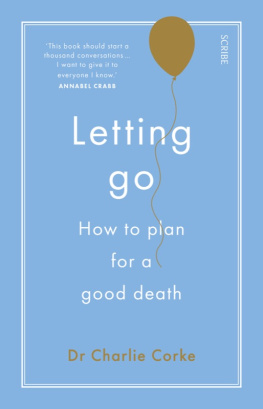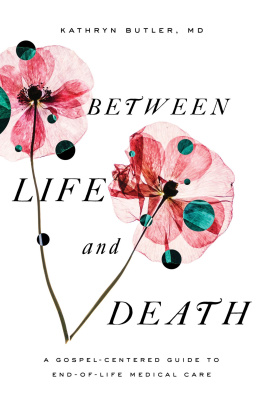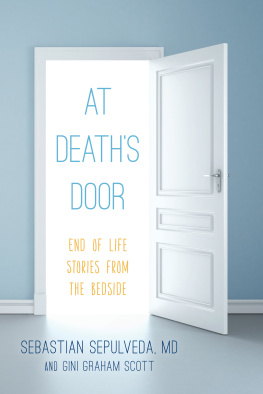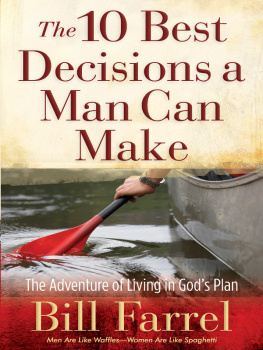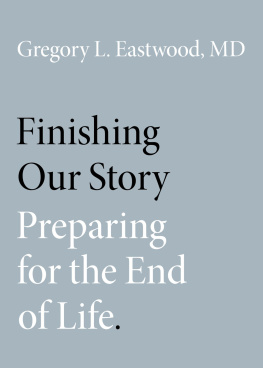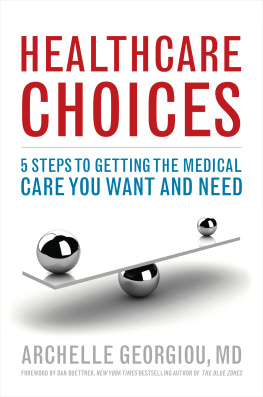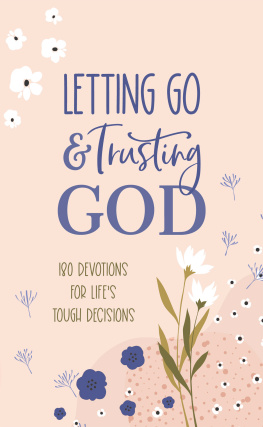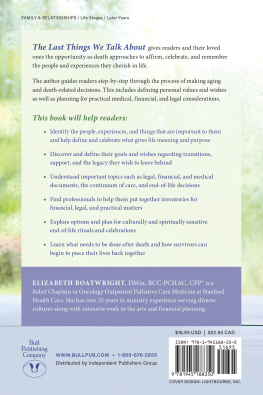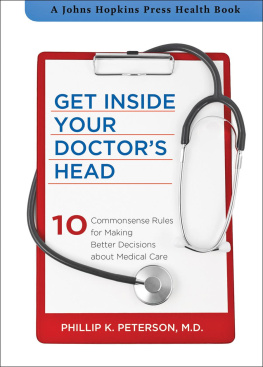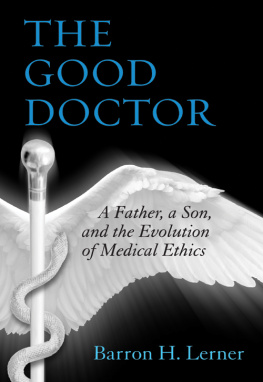
Contents
LETTING GO
Dr Charlie Corke (MB BS, BSc., MRCP[UK], FCICM) is one of Australias leading Intensive Care specialists and is currently President of the College of Intensive Care of Australia and New Zealand. He is the regional clinical lead for the Advance Care Planning program and is the originator of the MyValues approach to advance care planning (myvalues.org.au). Dr Corke lectures widely on medical communication and end-of-life decision-making, was featured on the ABC in the film In the End , and is a regular contributor to radio.
Scribe Publications
1820 Edward St, Brunswick, Victoria 3056, Australia
2 John St, Clerkenwell, London, WC1N 2ES, United Kingdom
Published by Scribe 2018
Copyright Charlie Corke 2018
All rights reserved. Without limiting the rights under copyright reserved above, no part of this publication may be reproduced, stored in or introduced into a retrieval system, or transmitted, in any form or by any means (electronic, mechanical, photocopying, recording or otherwise) without the prior written permission of the publishers of this book.
The moral rights of the author have been asserted.
9781925322705 (Australian edition)
9781911344858 (UK edition)
9781925548723 (e-book)
A CiP entry for this title is available from the National Library of Australia
scribepublications.com.au
scribepublications.co.uk
This book is dedicated to all the amazing patients
and families who have travelled this path
with courage and compassion.
Ours is a death-denying society and medicine is a death-denying profession.
David Kuhl
What tormented Ivan Ilyich most was the deception, the lie, which for some reason they all accepted, that he was not dying but was simply ill, and he only need keep quiet and undergo treatment and something very good would result.
Leo Tolstoy, The Death of Ivan Ilyich
The waning days of our lives are given over to treatments that addle our brains and sap our bodies for a slivers chance of benefit. These days are spent in institutions nursing homes and intensive care units where regimented, anonymous routines cut us off from all the things that matter to us in life.
Atul Gawande
Lives are like stories. The ending matters. Good stories dont have bad endings. Our lives are a composition of everything and the last bit matters just as much as everything else.
Anon
Authors Note
As a doctor, and an intensive-care specialist, I have looked after thousands of sick patients over many years. The vast majority survived, went home, and did well. These represent the good stories, the triumph of modern medicine, certainly the best part of my job. For these patients, decisions have generally been very straightforward, with little question that treatment was the right thing to do or that the treatment was wanted.
But this book isnt about these great stories. Its about those for whom life is falling apart, whose pre-existing health and future prospects are bad, and where outcomes of treatment have become predictably poor or inadequate (in their judgment).
This book explores the choices we make in these situations, and how poor choices can make the last bit of life so much worse.
As we fade towards the end of our life, we will increasingly confront situations where it would be quite reasonable to let death happen, but where it is also possible (and perfectly reasonable) to try to do everything to save or prolong life. It all depends on the wishes of the person who is sick.
These wishes are frequently unknown or unclear, but the decisions still have to be made.
Too frequently, we leave it until crisis strikes to start to think but a crisis is never the best time for careful thought, especially about something difficult.
When stark choices have never before been considered, the need to decide comes as a huge shock to families as they gather anxiously in an unfamiliar waiting room. Few are prepared for the task and many find the process impossible, generally electing to do something because it is just too difficult to do nothing . Doctors find it no easier, and, without very clear instruction or permission to stand back, almost every doctor will strive to save life.
Saving, healing, and curing are core principles of medical practice: for doctors, letting someone die is fundamentally at odds with this medical imperative.
Most of us dont want to leave problems for our family thats why we make a will. Planning for end-of-life decisions is just the same. Doing nothing risks causing distress and conflict for those left behind.
Death isnt something we can avoid. Assuming the natural order of things, our grandparents sicken and die, then our parents fail and die then, finally, its us (along with others in our generation). At each step of this process, we are confronted with decisions about how far to go and when to let go. We keep being involved, initially as bystanders and finally as participants.
Medicine now makes it very easy to go too far, making it vital to set limits unless, of course, you are one of those (few) who would never, never, want to give up for you, modern medicine has lots to offer, and generally delivers. But for those who have limits, it has become essential to communicate these.
As we struggle to make difficult decisions, it is important to be aware of things that might be influencing our decision-making. Recognising these influences helps us make wise decisions.
This book includes many stories that illustrate the numerous issues and dilemmas that can surround these difficult decisions.
These stories come from more than 20 years of medical practice. All are based on real cases, though names and circumstances have been altered, as appropriate, to protect privacy. Some stories are a fusion of a number of similar episodes (to avoid repetition and convey clearer messages). Some are personal.
I thank all those who have taught me, and all those whose experiences have contributed to the stories in this book.
I hope it will encourage more thought, better decision-making, and clearer planning that will lead to more appropriate, compassionate care.
CHAPTER 1
We all have to go sometime
It had been a busy, but not particularly unusual, day. I was completing the evening ward round in the Intensive Care Unit (ICU) when I was called to see Judy.
The medical intern wanted Judy admitted to the ICU. She had come to the medical ward the night before with a serious pneumonia, and, despite powerful antibiotics, she was continuing to deteriorate.
I went down to see her. The intern was right to be worried. Judy sat bolt upright in bed, struggling to breathe. She was amazingly thin, with almost no muscle left. I estimated her to weigh little more than 35kg. She looked well beyond her 79 years.
With every breath her eyes bulged and her neck tightened, as she used every muscle in the failing effort to get air into her damaged lungs. Sweat glistened on her forehead. Her skin was an ominous grey. Her lips were blue.
A bedside monitor showed very little oxygen in her blood, and that her heart rate was much too slow for the effort she was making. It all suggested that her breathing or her heart would stop at any moment.
I held her hand. She gave no response.
Beside me, the intern recounted the medical history. Judy had serious lung disease that had relentlessly progressed, despite treatment.
Before this crisis, she could walk only a few yards, the least effort resulting in distressing breathlessness. A simple trip to the toilet had become a major undertaking.
Tests confirmed severe, end-stage lung disease.
Next page
